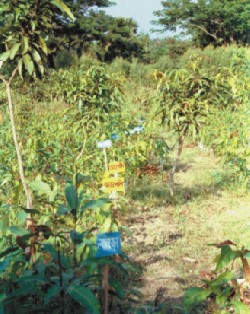"Together
we are much Stronger"
Charlotte
Jacquemart
 Nursery
owners in Faridpur and Rajshahi are discovering the benefit
of organising themselves in associations. As they take over
the lead of their associations, more and more from the local
NGO, a new relation develops between NGO staff and the Nursery
Malik Associations.
Nursery
owners in Faridpur and Rajshahi are discovering the benefit
of organising themselves in associations. As they take over
the lead of their associations, more and more from the local
NGO, a new relation develops between NGO staff and the Nursery
Malik Associations.
Since 1991
the Village and Farm Forestry Project (VFFP), run by the Intercooperation,
a NGO in Dhaka, has tried to develop local capacities for producing
timber and fruit tree saplings to meet the demand for afforestation
programmes and to satisfy farmers' needs. A second goal was
to develop a large network of professional sapling producers
whose entrepreneurship can contribute to local agricultural
development.
"Our
first attempt to build up a network was ill-designed,"
remembers Alain Cuvelier from Intercoorporation. "Before,
the individual nursery owners didn't feel as the associations
were their own," he added.
Implemented
by Intercooperation, the programme is financed by the Swiss
Development Corporation.
The
local NGO, the Development Community Centre (SDC), one of the
18 partners of VFFP, agreed to a new concept of associations.
Today, the five NMSs are associations of nursery owners each
consisting of 20 to 30 members based in a single upazila.
The five NMSs have already founded an association on district
level, the District Nursery Malik Samity DNMS.
Md. Munzurul
Karim from the IC and responsible for the districts of Faridpur
and Razbari says, "Our experience has been very good. The
NGO staff evolves toward a role of "accompanier".
And the nursery owners, instead of expecting everything from
the field staff, realise that they have their own competencies,
which they should value."
"Through
our new network we are better informed about the market and
we get access to public institutions and the government,"
adds Abul Kalam, the president of the DNMS in Rajshahi.
"Three
years ago I had no idea about how to organise a meeting, how
an association works. Now we have a bank account and gave out
some first loans to members," says Md. Rafiq, a member
of the DNMS.
A visit to
one of the nurseries showed how professional the nursery owners
have become. Abdul Mannan started his business only six years
ago. Today, he raises as many as 14 species of timber, and 15
species of fruit trees on 4 acres of land. His net profit last
year has been Tk 60,000.
Thanks to
the associations the nursery owners can improve their work.
"We are stimulated to increase the quality of our seeds
and plants. We grade and evaluate each others work and have
learnt to do an all-year-round planning," narrates Mannan.
They make
visits to other nurseries, exchange their knowledge and share
market information. They meet once a month and discuss their
problems. Technical skills can in this way be improved.
But still,
the nursery owners face other obstacles. One is the availability
of good quality seeds. Nowadays they get good quality seeds
from the mahogany trees as the associations marked 140 "Plus"
trees in the two districts. But many other seeds would still
be of poor quality.
The nursery
owners are also bothered by the illegal work of criminals who
collect seeds from fruit trees too early and sell them to India.
The inner part of the seeds is used for cork. The farmers have
no means to stop this illegal practice.
Yet there
are good chances that the nursery associations will evolve into
highly professional organisations. As they develop more confidence
and independence they will become entirely self-reliant in the
future. The examples of the NMSs show the way in which NGOs
could make their work in Bangladesh more sustainable.

 Nursery
owners in Faridpur and Rajshahi are discovering the benefit
of organising themselves in associations. As they take over
the lead of their associations, more and more from the local
NGO, a new relation develops between NGO staff and the Nursery
Malik Associations.
Nursery
owners in Faridpur and Rajshahi are discovering the benefit
of organising themselves in associations. As they take over
the lead of their associations, more and more from the local
NGO, a new relation develops between NGO staff and the Nursery
Malik Associations.